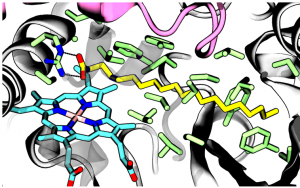Here I report a bit about my experience at CCES and where it led me.
My time at CCES began in 2014, as a postdoctoral fellow in Prof. Munir Skaf’s group. During a period of 5 years, I developed research in the area of computational simulations of biomolecules applied to the understanding of mechanisms of enzymes relevant to the conversion of lignocellulosic biomass and the molecular architecture of plant cell walls. An important part of this work was carried out during a visit to the National Renewable Energy Laboratory, in the USA, funded by Fapesp, where I studied the reactive mechanisms of enzymes with multi-scale methods based on quantum and classical mechanics coupled with supervised machine learning algorithms for prediction of reaction coordinates – a task traditionally performed by trial and error, often leading to unsatisfactory results. These researches, made possible by CCES, allowed establishing a bridge between Computational Chemistry and the Artificial Intelligence area.
Back to Brazil, and already finishing my activities at CCES, in 2019, I started planning my future research activities. With all the experience acquired at CCES in the area of Computational Chemistry, and given my great interest in enzymes relevant for biocatalysis applied to the synthesis of renewable products, I decided to venture into the mechanisms of a group of new enzymes that possess the unique ability to synthesize hydrocarbons from fatty acids and derivatives – abundant and renewable raw material. Molecular details of one of these enzymes are shown in the picture, where you can see a fatty acid in the process of being transformed into a hydrocarbon. The production of these renewable hydrocarbons roughly means the production of renewable replicas of petroleum that could be used to produce gasoline, diesel, kerosene, and other renewable petrochemicals. However, very little is understood of the mechanisms of these enzymes (except that they follow entirely divergent pathways from phylogenetically related enzymes) and the molecular bottlenecks associated with hydrocarbon synthesis. With all the computational background I acquired at CCES, especially the ability to couple traditional methods of computational chemistry with recent algorithms linked to Artificial Intelligence, the challenge of understanding these enigmatic enzymes and thus contributing to the advancement of new sustainable technologies became more and more inviting.
With this proposal, I acted, in 2020, as a researcher in the area of Computational Biocatalysis at the National Laboratory for Biorenewables of the National Center for Research in Energy and Materials, where I started the computational research of enzymatic synthesis of hydrocarbons and where also experimental research in this same area was being initiated. Also in 2020, at the end of the year, I joined the permanent faculty of the Department of Physical Chemistry of the Institute of Chemistry at UFRJ, where I am pursuing my scientific interests and taking the initial steps towards building a research group.

Fatty acid (yellow) bound to an enzyme of the cytochrome P450 family in position to undergo decarboxylation reaction and transform into a hydrocarbon.

